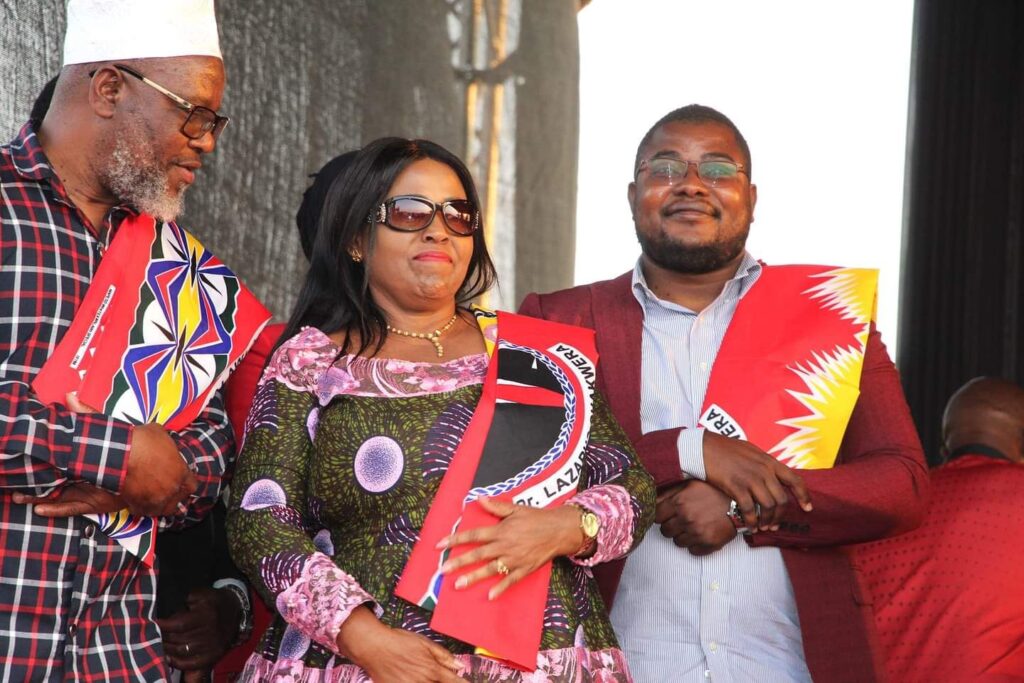By Twink Jones Gadama
The Democratic Progressive Party (DPP) has been facing a mass exodus of its members to the Malawi Congress Party (MCP), sparking concerns about the potential impact on the party’s unity and strength.
However, a closer look at the defectors reveals that most of them are “rejects” who had lost influence and relevance within the DPP.
Heatherwick Ntaba, for instance, had been invisible for the past four years, while Imran Mtenje was reassigned to a less influential role as presidential advisor from regional governor for the eastern region.

Similarly, Grezelder Jeffrey was fired and lacks any significant following among her fellow former members.
These individuals, among others, have been welcomed with open arms by the MCP, but their addition is unlikely to bolster the party’s chances.
The MCP’s Strategy: Weakening DPP or Strengthening Itself?
The MCP’s decision to accept DPP defectors raises questions about its strategy. Is the party genuinely interested in strengthening its ranks, or is it attempting to weaken the DPP by creating an illusion of division? The answer lies in the MCP’s track record.
Since taking power, the MCP has struggled to fulfill its campaign promises, leading to growing discontent among its supporters. By embracing DPP defectors, the MCP aims to shift attention from its own shortcomings and create a false narrative of DPP’s weakness.
DPP’s Unity Remains Intact
Despite the defections, the DPP’s unity remains intact. The party’s leadership has reaffirmed its commitment to its ideals and values, ensuring that the departure of a few individuals does not destabilize the party.
In fact, the DPP’s resurgence has left the MCP growing increasingly uneasy. The MCP’s attempts to poach DPP members may be seen as a desperate measure to shore up its own weaknesses.
Why DPP Shouldn’t Worry
Lack of Influence in the Fired Members
The former DPP members who joined MCP lack significant influence within their former party and in national politics. Individuals like Heatherwick Ntaba, Imran Mtenje, and Grezzelda Geoffrey had become peripheral figures, struggling to make an impact. Their departure doesn’t weaken DPP’s structural integrity. Their limited influence and lack of grassroots connection render them ineffective in swaying public opinion or affecting DPP’s policy direction. MCP’s acceptance of these members may boost its numbers but not its credibility or capacity.
Desperation of MCP
MCP’s eagerness to accept DPP defectors betrays its desperation. Having failed to deliver on campaign promises, MCP seeks to divert attention from its shortcomings. By embracing DPP rejects, MCP attempts to create an illusion of DPP’s weakness and its own strength. This strategy aims to mask MCP’s internal power struggles, policy inconsistencies, and growing discontent among its supporters. MCP’s desperation may yield short-term propaganda gains but ultimately undermines its credibility and exposes its lack of vision.
Unity Intact in DPP
Despite defections, DPP’s unity remains intact. The party’s leadership has reaffirmed its commitment to its ideals and values, ensuring continuity and stability. Core members and leaders remain loyal, and internal structures function cohesively. DPP’s resilience stems from its strong ideological foundation, robust internal democracy, and collective ownership. Defections by peripheral members do not destabilize the party’s core. Instead, DPP’s unity has been reinforced through renewed focus on its principles and a strengthened sense of purpose.
Grassroots Support for DPP
DPP maintains a robust grassroots presence, ensuring its connection with the people remains unbroken. The party’s structures at district, constituency, and village levels remain intact, providing a solid foundation. DPP’s engagement with local communities, listening to their concerns, and addressing their needs has fostered loyalty and trust. This grassroots support base provides DPP with a reliable source of strength, shielding it from the impact of defections. MCP’s attempts to poach DPP members will not dismantle this grassroots network, which remains a vital source of DPP’s resilience.
The Impact of Defections
While defections can be damaging, the DPP’s case is unique. The departing members were largely peripheral figures, lacking the influence and credibility to sway public opinion.
In contrast, the DPP has retained its core leadership and membership, ensuring continuity and stability. The party’s vision and policies remain unchanged, and its commitment to the people of Malawi remains unwavering.
MCP’s Credibility Questioned
The MCP’s decision to accept DPP defectors raises questions about its credibility. By embracing individuals who have failed to deliver in their previous roles, the MCP risks compromising its own integrity.
Conclusion
The DPP should not lose sleep over its former members joining the MCP. The “rejects” being embraced by the MCP lack the influence and impact to make a significant difference. Instead, the DPP should focus on its strengths and continue to build on its resurgence.
As the political landscape evolves, the DPP must remain vigilant, reinforcing its unity and reaffirming its commitment to the people of Malawi. The party’s dedication to its ideals and values will ultimately determine its success.










